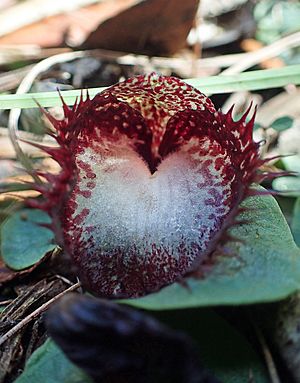Bristly helmet orchid facts for kids
The Bristly helmet orchid, scientifically called Corybas hispidus, is a special type of orchid that grows only in eastern Australia. You can easily tell it apart from other helmet orchids because it blooms in autumn and winter. Its most unique part is its "labellum" (a special lip-like petal). This part has a creamy-white center covered in tiny bristles and a deep notch at the top.
Quick facts for kids Bristly helmet orchid |
|
|---|---|
 |
|
| Corybas hispidus near Ebor | |
| Scientific classification |
|
| Kingdom: | Plantae |
| Clade: | Tracheophytes |
| Clade: | Angiosperms |
| Clade: | Monocots |
| Order: | Asparagales |
| Family: | Orchidaceae |
| Subfamily: | Orchidoideae |
| Tribe: | Diurideae |
| Genus: | Corybas |
| Species: |
C. hispidus
|
| Binomial name | |
| Corybas hispidus (D.L.Jones)
|
|
| Script error: The function "autoWithCaption" does not exist. | |
| Synonyms | |
|
Corysanthes hispida D.L.Jones D.L.Jones & M.A.Clem. |
|
Script error: No such module "Check for conflicting parameters".
What it Looks Like
The Bristly helmet orchid is a plant that grows from the ground. It is a perennial plant, meaning it lives for more than two years. It is also deciduous, so it sheds its leaves each year. This orchid has an underground tuber, which is like a small, round storage organ.
Each plant has one dark green leaf. This leaf is mostly round, about 15 to 35 millimeters (about half an inch to 1.4 inches) long and wide. The underside of the leaf is silvery-green or reddish.
The Flower
The orchid produces a single flower that is reddish-purple and white. It has a greenish-grey "dorsal sepal" (a leaf-like part at the back). This sepal often has red or dark purple spots. It is shaped like an egg or a spoon and forms a hood over the "labellum." When flattened, this sepal is about 22 to 35 millimeters long and 11 to 18 millimeters wide.
The "lateral sepals" are thin and straight, about 5 to 9 millimeters long. The petals are also thin, about 5 millimeters long.
The Labellum
The "labellum" is a special, tube-shaped petal. It is about 20 to 30 millimeters long and wide. Its edges have many small, tooth-like parts. The center of the labellum is dome-shaped and white. It has a notch at the very top. This surface is covered with short, stiff bristles, which is how the orchid gets its name!
Bristly helmet orchids usually bloom from March to August.
Naming the Orchid
The Bristly helmet orchid, Corybas hispidus, was first officially described in 1973. A botanist named David Jones found a sample of this orchid near a village called Wulgulmerang. He published his description in a science magazine called The Victorian Naturalist. This was the first of many orchids that David Jones would describe.
The second part of its scientific name, hispidus, is a Latin word. It means "bristly," "rough," "hairy," or "prickly." This perfectly describes the bristly labellum of the orchid!
Where it Lives
You can find the Bristly helmet orchid in south-east Queensland. It also grows on the ranges and tablelands of New South Wales. In Victoria, it prefers sheltered spots in the far north-eastern part of the state.
 | Calvin Brent |
 | Walter T. Bailey |
 | Martha Cassell Thompson |
 | Alberta Jeannette Cassell |

